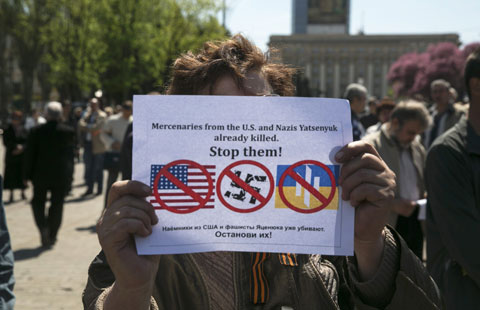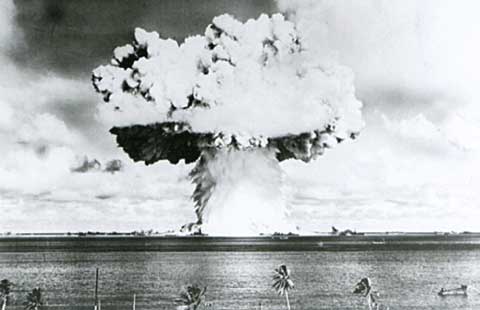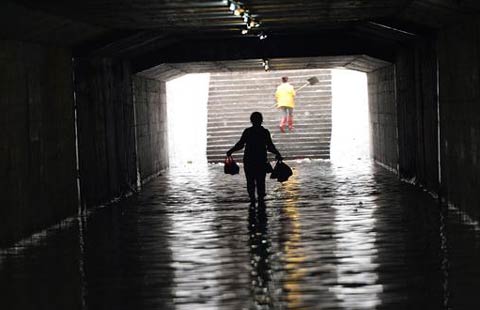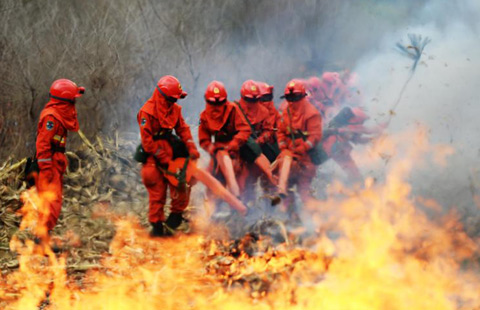US should learn from allies' actions
Updated: 2014-04-24 07:00
By Gu Yongxing and Cui Jianshu (China Daily)
|
||||||||
That Sino-US ties are the most important bilateral relationship of the 21st century is widely accepted by politicians and scholars on both sides. For the US, that means it cannot ignore China in its global strategy especially when it comes to the Asia-Pacific region.
That's essentially why US President Barack Obama is visiting Japan, the Republic of Korea, Malaysia and the Philippines just one week after US Secretary of Defense Chuck Hagel concluded his visit to China, Japan and Mongolia. Such frequent visits by top US leaders to Asia carry deep strategic meanings. For instance, their visits are aimed at strengthening the US' ties with its allies in the region, in particular boosting Japan's confidence to counter China's growing influence.
Since the end of 2013 there has been a growing feeling within the US and among its allies that Washington is not being able to protect the latter's core interests. Their worry has aggravated after Russia annexed the Crimea region of Ukraine dealing a blow to the US' image of invincibility.
The US didn't defend Ukraine as the Budapest Memorandum in 1994 requested. This is like a warning for Japan. So Washington must give Tokyo some security reassurance to prevent it from drifting away from the US-Japan alliance. However, the US is not in a position to promise much because it cannot change its position of not involving itself in a possible China-Japan conflict. In fact, raising the tone of rhetoric is an admission of lack of confidence, which is exactly what Hagel has done, and Obama will do in Japan.
The Japanese government seems to have taken Obama's visit as a sign of encouragement for its rightist policies. After Japanese Prime Minister Shinzo Abe sent an offering to Yasukuni Shrine on April 21, 146 Japanese lawmakers visited the controversial memorial that honors 14 Class-A war criminals.
US leaders also have other purposes for visiting Asia frequently, most important of which is to push forward Obama's "rebalancing" to Asia policy. At present, the five US warships docked in (or sailing around) Japan are equipped with Aegis ballistic missile defense systems. By sending two more ships to Japan, the US can further strengthen the fighting ability of the US-Japan alliance. The move is aimed at containing China, which the US considers as its ultimate competitor in the region.
To consolidate its presence in the Asia-Pacific, the US has also rallied the support of the Association of Southeast Asian Nations. At the inaugural US-ASEAN Defense Forum, held in Honolulu from April 1 to 3, the US played up the "China threat" theory to win the support of ASEAN member states that have maritime disputes with China. It also presented to them the possibility of China establishing an Air Defense Identification Zone over the South China Sea as an offensive move.
The US' intention is to form a circle around China, but it is not likely to succeed in its designs considering the rising sense of nationalism in Southeast Asia. Didn't Philippine citizens protest against the docking of a US nuclear submarine in Subic Bay in May 2012?
But the US could succeed in increasing its arms sales, for it knows that encouraging an arms race in Asia is a best way of doing so. Thanks to the US playing up the "China threat" theory, Japan is busy buying US-made drones, while the ROK has shown interest in its Patriot PAC-3 land-based missile defense system. Even the Philippines, which is facing recession, is buying warships and fighter planes from the US. The visits of Hagel and Obama will probably boost US arms sales further.
China's peaceful rise has instilled in the US a sense of crisis because it is losing its leading position in the Asia-Pacific. Therefore, Obama is likely to use his rhetoric against China to get the maximum out of his Asian tour, just like Hagel did. But the two US leaders' efforts may not yield the desired results because America's allies in the region don't want a confrontation with their neighbor China. Just a few days ago, Mongolia accorded a warm welcome to Hagel and showed interest in modernizing its military but firmly rejected his request to allow the US to set a military base in the country. That should be a lesson for the US.
The authors are professors at PLA International Relations University.
(China Daily 04/24/2014 page9)

 Amazing manhole cover graffitos dazzle campus
Amazing manhole cover graffitos dazzle campus
 Pro-Russian protesters occupy TV building in eastern Ukraine
Pro-Russian protesters occupy TV building in eastern Ukraine
 Cars with colorful cartoon drawings parade in Hangzhou
Cars with colorful cartoon drawings parade in Hangzhou
 Young laborers shun tea harvesting
Young laborers shun tea harvesting
 Old US nuclear explosion images released
Old US nuclear explosion images released
 Ballerina-to-be in audition
Ballerina-to-be in audition
 Red alert for rainstorm issued in S China's Liuzhou
Red alert for rainstorm issued in S China's Liuzhou
 Forest team tackles fire drill in NE China
Forest team tackles fire drill in NE China
Most Viewed
Editor's Picks

|

|

|

|

|

|
Today's Top News
Huawei executive says it still seeks US sales
Rethinking ink
Chinese artist gets Broadway laughing
Farewell held for Xu
China will not be 'intimidated': envoy
Dominic Ng completes term as C-100 chairman
China seeks to resolve disputes through peaceful talks: ambassador
US TV series off China's sites
US Weekly

|

|






